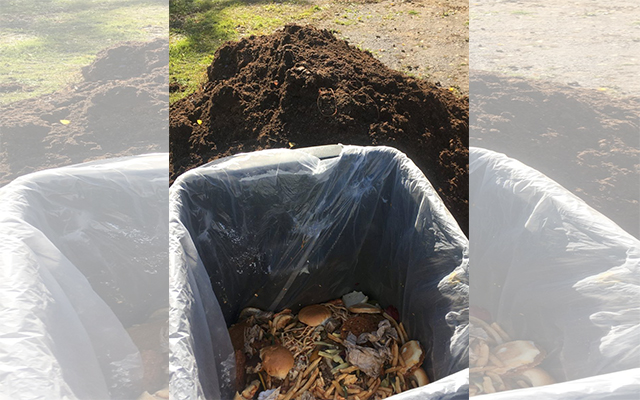
CARIBOU, Maine — Each morning, Janice Logan prepares three aluminum water bottles for her children and fills them with ice water from her refrigerator.
The bottles, she said, come with clips to attach to her children’s backpacks so that each of them can take a bottle to school and refill it throughout the day.
Not only is this her way of reassuring herself that her children are staying hydrated throughout the day, she said, it is also her “tiny additional way” of curbing pollution.
“As I have grown older, I have become more cognizant of what I buy and throw away and how it ends up in the landfill,” she said on Monday. “I am trying to teach my kids not to throw away so much, and if they keep refilling a water bottle at school, they will not go to the vending machines and buy bottles of water or juice. Most of the time, they don’t have time to finish the whole thing, and it is a waste of money and it ends up piling up.”
Recycling and conservation is becoming more common in schools throughout Aroostook County now, according to local administrators, with the implementation of more education around the subject and the establishment of “green committees” to spearhead initiatives. The overall goal of reducing items that schools and colleges throw away includes food, plastic and clothing.
Elaine Boulier is the superintendent in SAD 42 in Mars Hill. She said that both Fort Street Elementary School and Central Aroostook Junior/Senior High School have water coolers in their buildings so that students can easily refill their own water bottles.
“It is something we’ve been doing for some time,” she said. “We got the water coolers through a grant, actually.”
The move, she said, was sparked by observations that students were purchasing items from juice machines at the school.
“We were mainly worried about hydration, initially,” she said. “The coolers help keep the students hydrated, but they also cut down on the number of sugary beverages they drink and the amount of plastic that piles up. We recycle, of course, but you can still reduce that.”
At the University of Maine at Presque Isle, the college began turning their cafeteria waste into high-quality compost for soil enrichment in January. They received a $5,650 grant from the Maine Department of Environmental Protection through its Grants to Support Recycling and Organics Management Initiatives in order to do so.
The grant project is a collaboration between UMPI’s Agricultural Science and Environmental Science and Sustainability faculty, Green Committee, Facilities crew, and campus food service vendor Sodexo.
Jason Johnston, grant project lead and dean of the
College of Arts and Sciences, said during a recent interview that all pre- and post-consumer food items, including meat and napkins, will be composted as part of this project. Officials expect the project will divert an average of 1.94 tons of waste per month from the landfill waste stream, or 23.34 tons annually. Funding will support labor, supplies, and the transportation of composting materials for one year.
The compost pile is located at the edge of campus behind Gentile Hall, consisting of a 180-foot-long by 80-foot-wide gravel base with space for several 30-yard piles of compost at different stages. The college also had a compost pile for five months last year.
“Food is a significant portion of the campus waste,” he said. “That was something our Green Committee thought of immediately as something we could change on campus.”
Besides the compost, he said, Sodexho got rid of trays in the cafeteria to discourage students from taking more food than they end up consuming.
“If you have them coming back for a plate instead of putting two or three plates of food on the tray, it does cut down on food waste,” he said. “We believe that is helping us, and it cuts down on food cost in the end.”
For catering events, Sodexho has eliminated plastic plates and instead turned to ones made from palm leaves, he said.
The University of Maine Presque Isle also has a 20-kilowatt, 90-panel solar photovoltaic system on the roof of Pullen Hall, and a biomass boiler and heat pumps that were installed in 2011 in a $2.3 million energy efficiency renovation of the Pullen building.
At Northern Maine Community College, students and staff also compost organic waste, as well as collect bottles, cans, lightbulbs, batteries and more for recycling, according to Griffin Goins, associate director of development and college relations.
In 2011, the University of Maine at Fort Kent also took a big step toward energy efficiency by converting the oil heating system at The Lodge, which is its largest residence hall, and the UMFK Sports Center to a biomass system. The biomass system provides heat for 1.75 acres of floor space and is expected to save the campus nearly $1 million in heating costs in the next decade. University officials received a $500,000 Department of Conservation Act grant funded under the American Recovery and Reinvestment Act of 2009 to finance the effort.




